82 Search Results for motivation
August 13, 2015
by Carole Zangari -
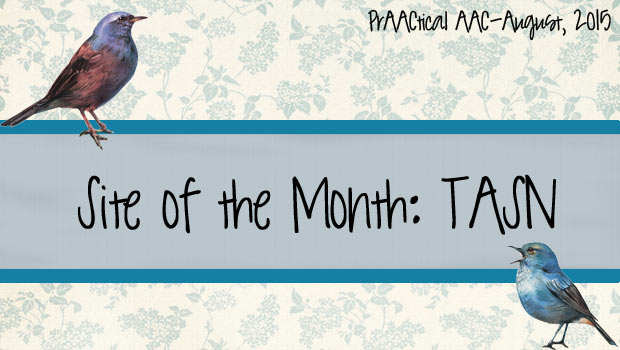
August’s Site of the Month is chock full of resources for professionals and families working with individuals who have ASD. The Kansas Autism Spectrum Disorders website is maintained by the TASN Autism and Tertiary Behavior Supports. Among the highlights: Over 150 social narratives Downloadable materials for communication 50+ classroom resources, including data forms, visual supports, and more Summary sheets on things like The Incredible 5-point Scale, motivational assessments, and reinforcer preference assessments. Dozens of examples of visual tasks A wide variety of archived webinars Hope you enjoy exploring this site!
August 4, 2015
by Carole Zangari -
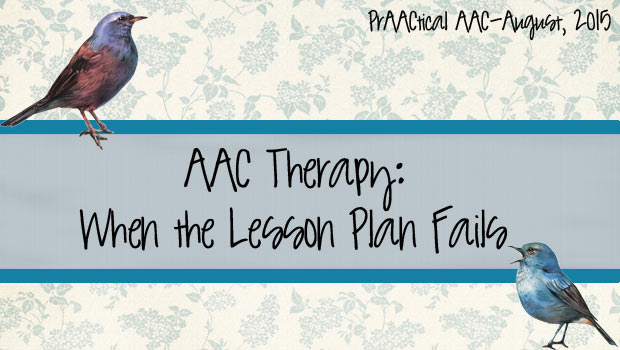
We’ve all been there. You have meaningful goals, engaging materials, and a solid lesson plan for our therapy session. Five minutes into the session, it’s clear that the AAC learner has little or no interest in what we’ve prepared. Now what? Our choices are limited: persevere with the plan, modify it somewhat, or scrap it entirely. What’s a clinician to do? Take A Breath The first thing to do is breathe. Know that you are not the first one to struggle to engage this learner, and you won’t be the last. Think of it not as an excuse for an unproductive session but as a problem-solving challenge. Previous clinicians may have justified the session’s difficulties and atttibuted them to the learner’s lack of engagement, limited attention span, or behavioral problems. Personally, I feel sad for those clinicians because when we take that approach, not only do we fail the client,... [Read More...]
July 20, 2015
by Carole Zangari -
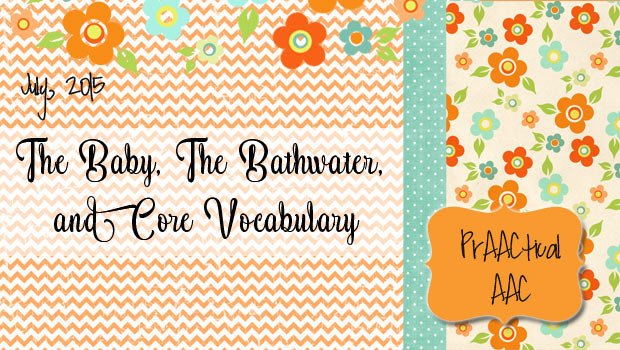
When we first started writing to advocate for core vocabulary, it was as a counterpoint to the noun-heavy, activity-specific AAC supports that were widely used among beginning communicators. Many times, those communication aids were great for getting communication started with our beginning communicators, but limited their ability for generative language development. Adding core vocabulary provided a lot of linguistic power, and for many learners, that’s a great thing. These days, most clinicians serving people with AAC needs are well aware of the need to populate their AAC systems with a sizable array of high-frequency core words. SLPs have, by and large, gotten the message that core vocabulary plays an important role for AAC learners. In some cases, though, the pendulum has swung a bit too far. An AAC a system built exclusively of single words with only core vocabulary is not likely to meet the needs of most AAC learners.... [Read More...]
May 14, 2015
by Carole Zangari -
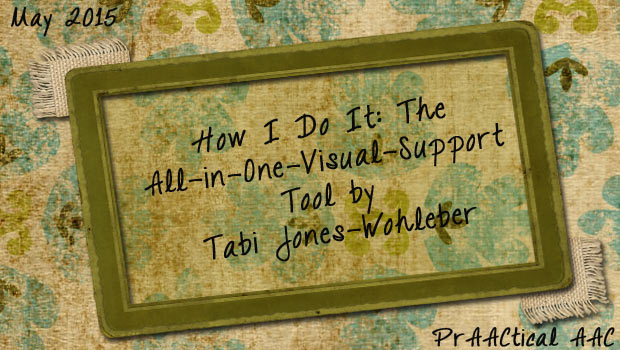
I am constantly in awe of the creativity and generosity of AAC practitioners, particularly those like Tabi Jones-Wohleber who make fabulous materials and share them with colleagues that they’ve never even met. Tabi is an SLP on the AT Team for Frederick County Public Schools in Maryland. A graduate of Penn State University, her career has focused on AAC. Though she works with many schools and addresses a variety of AT needs, most of her time and creative energy is devoted to working with students with the most significant disabilities. In this post, she introduces us to the All-in-One-Visual-Support Tool. You wont want to miss Tabi’s treasure trove of prAACtical materials. :::::::::::::::::::::::::::::::::::::::::::::::::::::::::::::::::::::::::::::::::::: It was a conversation I’d had many times before. A conversation that kept resurfacing in one form or another. It’s the conversation of how to manage all the stuff; all the visuals, all the reinforcers, all the communication tools. The benefit of visual supports to... [Read More...]
April 7, 2015
by Carole Zangari -
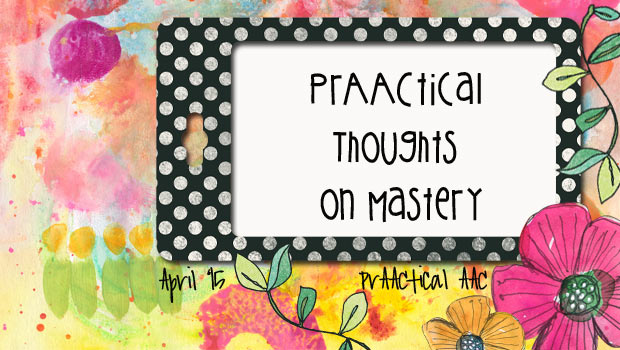
In many clinical training programs, new SLPs are taught to teach skills to mastery level, which generally means something like “80% over 3 consecutive sessions.” For our clients who are developing communication skills using AAC, though, this isn’t always the best approach. Here’s why. It doesn’t always make sense. Having a single standard for mastery is useful as a clinical management tool, but often doesn’t make sense in individual situations. Consider the skill itself. Would you be comfortable with your clients being 80% accurate when they: Cross the street? (Of course not.They need to be 1,000% accurate with that.) Ask for things? (Probably. Although Johnny has many days where he’s pretty happy with everything and doesn’t really have clear preferences or desires that we can ascertain. It would be nice to respect that. Not to mention the fact that he might want something that we haven’t offered him.) Make a... [Read More...]
February 12, 2015
by Carole Zangari -

Those of you who are still digging your way out of the most recent snowstorm may not believe it, but it’s almost time to make plans for summer. There are quite a few AAC camps, some that are quite well established and others that have been running for only a few years (see our AAC Camp Pinterest board here). In this post, we hear about one of them from Tina Moreno, an SLP and mom of Mateo, who uses PicturePower 100 on the Maestro to communicate, maintain friendships with his teammates on the cross country team, advocate for himself, reveal his wicked sense of humor, and even sing the National Anthem for his high school’s basketball games. Tina blogs at Voices4All. With the help of Drs. Karen Erickson and David Koppenhaver, she and her friend Gina Cunningham created Camp ALEC together in memory of Gina’s son Alec, who never gave up, and... [Read More...]
September 29, 2014
by Carole Zangari -
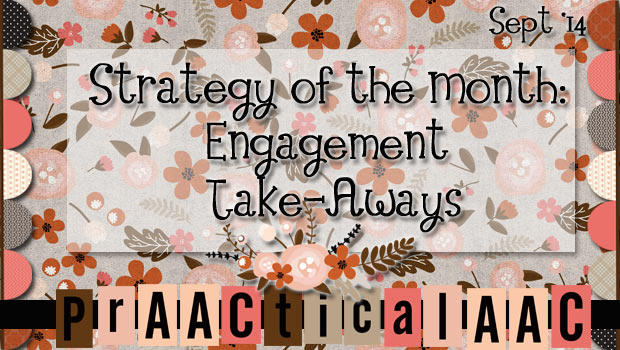
We’ve been musing about engagement this month. Here are some final lessons we’ve learned along the way. “If you don’t believe in me, you won’t be a successful interventionist.” “Put yourself in my shoes once in a while. Be aware of how much focus and effort it takes for me to cope with sensory input, breathe, swallow, and move so that you can plan activities at an appropriate level of difficulty.” “Set a top priority for the lesson, and let me focus on that. It’s hard to sustain interest and motivation when you make things challenging on ALL fronts: cognitive, linguistic, motoric. Pick one area in which to challenge me and let’s dive in!” “Make it worth my while to work hard. We all look for rewards and compensations that are proportionate to the effort expended. I’m no different than you in that respect.” “Use my areas of interest when you... [Read More...]
September 22, 2014
by Carole Zangari -
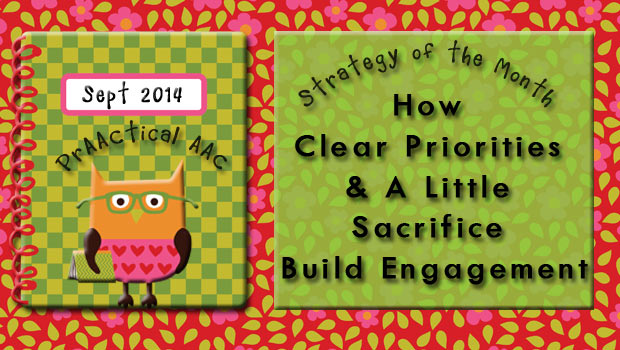
We can’t complete our thoughts on engaging AAC learners without a bit of conversation around the topic of priorities. Here’s the main idea: Go into each activity having a clear priority for what you want to achieve. Everything else become negotiable. As SLPs, sometimes we want it all. We want therapy activities where the AAC learner initiates communications, uses new vocabulary, creates novel sentences, experiments with new grammatical forms, and kicks some morphological butt. We.want.it.all. After a few decades of being an AAC practitioner, I think I’m finally learning that trying to have it all isn’t always the best option. It isn’t about what I want, it’s about what my client needs. Sigh. In this approach, we look at the lesson or activity and create our “Must Have List.’ For Mayra, a kindergartner just learning to use symbols for the first time, our lessons ‘must’ be engaging, have high pay-off... [Read More...]
May 21, 2014
by Carole Zangari -
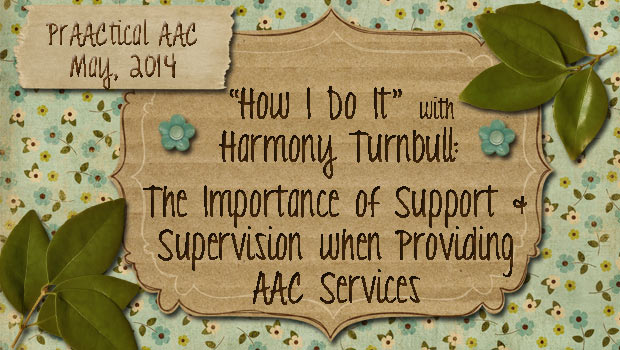
We are so thrilled to have a guest post today, from Australian SLP Harmony Turnbull. Harmony is a Consultant Speech Pathologist for Ageing, Disability and Home Care in NSW, Australia. In her role, she provides support and supervision to senior speech pathologists, carries a small caseload of people with complex needs and provides expert consultancy for management. She has specialised in supporting people with disabilities including complex communication needs for 11 years and is addicted to networking. She can often be found sharing her knowledge and asking many questions on Facebook and Twitter (@SP_Harmony). Harmony is passionate about the work speech/language pathologists can do to improve the quality of life for people with disabilities. The Importance of Support and Supervision when Providing AAC Services Scenario – Jane Jane is an SLP who has been working with people with disabilities for over 5 years, including people with complex communication needs. Her caseload... [Read More...]
May 10, 2014
by Carole Zangari -
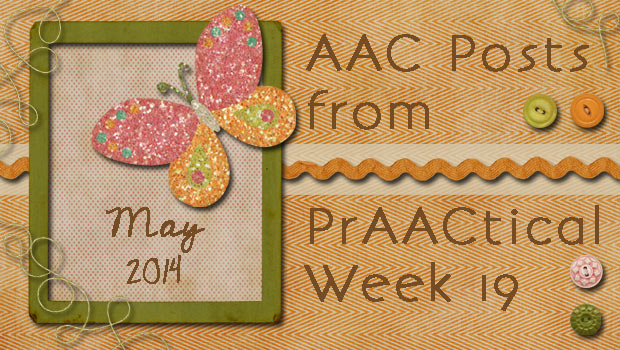
Sunday – Video of the Week: Shared Book Reading Monday – Strategy of the Month: Understanding and Supporting Families of AAC Learners Tuesday – Teach Me Tuesday: Sounding Board by AbleNet Wednesday – Watch It Wednesday: Visuals Everyday by Mariacarmen Saleta Thursday – AACtual Therapy: On Motivation and AAC with Samantha Weatherford Friday – Core Words Visualized 2014









